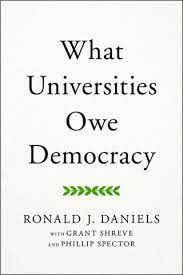You have /5 articles left.
Sign up for a free account or log in.
 What Universities Owe Democracy by Ronald J. Daniels, Grant Shreve and Phillip Spector
What Universities Owe Democracy by Ronald J. Daniels, Grant Shreve and Phillip Spector
Published in October 2021, Johns Hopkins University Press
This decade’s second-best-timed higher education book is What Universities Owe Democracy.
The first-best-timed higher education book will emerge when Bryan Alexander’s Universities on Fire (also JHU Press) is published this coming March.
Ronald J. Daniels, president of Johns Hopkins University, was writing the conclusion to his book just weeks after the Jan. 6, 2021, attack on the Capitol Building.
As Daniels points out, never in living memory has our U.S. democracy felt so fragile. The fundamental tenets of liberal democracy, such as the adherence to free and fair elections and the peaceful transition of power, are under attack.
Daniels argues that colleges and universities have largely abdicated any responsibility to preserve and solidify democratic norms, structures, behaviors and habits of mind. He points out that the U.S. has primarily left civics education to the K-12 system. Foundational and required political history and philosophy courses have been displaced by an ever-increasing set of requirements within specific majors.
Beyond the curriculum, Daniels believes universities have done far too little to help students learn the skills of constructive dialogue across differences. He worries that too few campus speaking events take the form of debate and discussion.
While celebrating the growth of campus affinity groups and organizations devoted to providing resources and space for underrepresented minorities, he believes that colleges could do much more to create opportunities for people of different backgrounds, demographics and political leanings to come together.
The argument that focusing on liberal democratic norms and values should be one of the organizing principles of a college education may strike some readers as noncontroversial. As we continue to live through the political, social and cultural wreckage wrought by Trump’s big lie, who can argue that universities should include the teaching of the history and structures of democratic societies as at least part of their missions?
Where Daniels might invite some controversy is his insistence that a crucial step for universities to support liberal democratic values is to do away with the practice of legacy admissions. He cites compelling evidence from the experience of Hopkins and other schools that have ended the practice, noting that alum engagement (and giving) did not erode after the change.
The fact that legacy admissions gives preference to a likely already privileged group of applicants is undeniable. After reading What Universities Owe Democracy, I’m curious to see if this book succeeds in igniting debates on these practices across elite universities.
What Universities Owe Democracy can be read in several ways. The book offers concrete, actionable and reasonable ideas for how universities can support liberal democratic values and goals. Daniels draws from his long experience as an academic leader at Hopkins and Penn (where he was previously provost) and examples from various colleges and universities.
Another way to read What Universities Owe Democracy is as a concise history of higher education. Students of the evolution of the university will learn much from reading this book. Daniels provides historical context for suggestions to reshape the curriculum and student life in ways that educate and support liberal democratic values.
A third way to read What Universities Owe Democracy is as a blueprint for academic leadership. Daniels explains that university presidents are almost always unable to lead their institutions by decree. Faculty have power over the curriculum, and many stakeholders must be persuaded if significant changes are to be made.
In writing this book, Daniels invests in the marketplace of ideas that ultimately determine the reach and durability of many institutional initiatives.
It is a wonder to me where Daniels found the time as a university president to research and write this compelling and closely argued book. (Note: The book is co-authored by Grant Shreve and Phillip Spector, a fact that may go a long way in explaining how president Daniels was able to get the book completed).
The area that I wish Daniels had explored more in What Universities Owe Democracy is around teaching and learning. Specifically, I kept waiting for Daniels to talk about the role of centers for teaching and learning and the role that the educators who work at CTLs could play in partnering with faculty on courses and programs designed to teach about democracy.
Faculty have the subject matter and disciplinary expertise to educate about liberal democratic values and structures. Pair that subject matter expertise with the pedagogical knowledge of faculty developers, instructional designers and other nonfaculty educators—and what can emerge are powerful (and maybe scalable) student learning experiences.
The Center for Teaching Excellence and Innovation at Hopkins is a prime example of just such an amazing CTL, staffed by an incredible group of educators. I wish President Daniels had found a way to work that CTL, and others like it, into his ideas around higher education change.
What are you reading?




